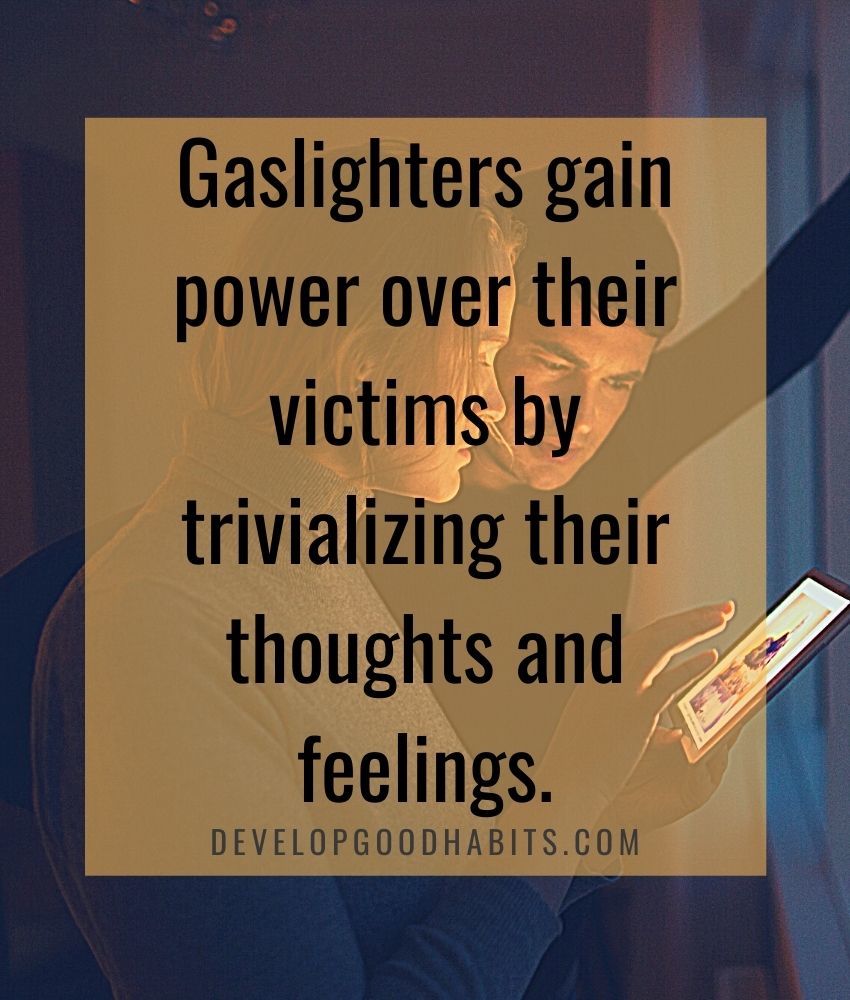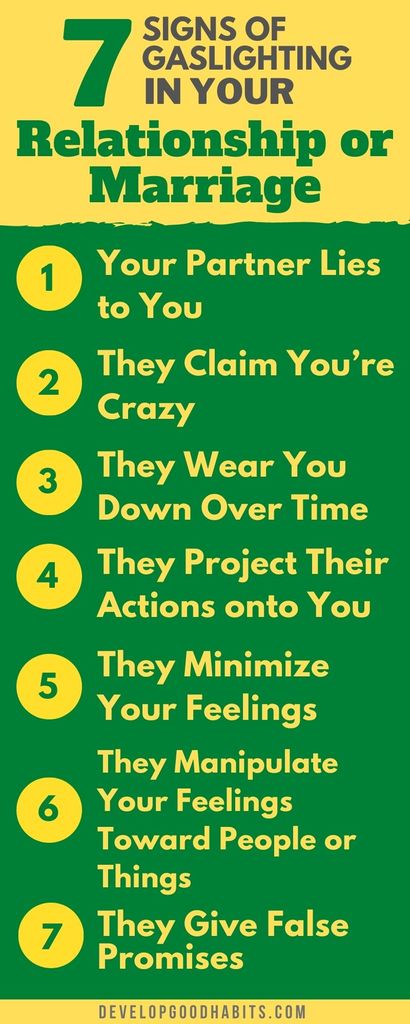“Stop being so sensitive.”
“Don’t you think you’re overreacting?”
From the 1944 movie, Gaslight, to being one of 2018’s most popular words of the year, this manipulative tactic has proven to be effective for anyone trying to gain control over someone else.
Gaslighting gained popularity among professionals in the 1980s when gaslighting was written about in academic journal articles focusing on women’s socialization.
Experts believed that society trained women to feel like they needed to be in a relationship and have a romantic connection, which put them at risk of exploiting their attachment, which is essentially what gaslighting boils down to.
This often happens in relationships or marriages in an attempt to break one’s partner down to the point that they’re so low on self-confidence, they don’t think they could ever live without their gaslighting partner.
In this article, we are going to look at what gaslighting is and then explore 7 signs that may indicate you’re a victim of gaslighting yourself.
Let’s get started by defining the term in more detail.
What is Gaslighting?
Gaslighting is a form of emotional abuse used to gain control over someone else by confusing and disorienting them. This sophisticated manipulation technique often leads a victim to question their own sanity, and in doing so, failing to second-guess their partner’s motives.
By undermining someone’s sense of reality by denying their thoughts, feelings, or environment, victims often turn away from their emotions, cognitions, and ultimately who they are as people.
Gaslighting can occur in a variety of relationships, including those with coworkers or managers, parents, and friends. However, the most devastating forms of gaslighting may be when it’s happening in a relationship or marriage.
When this happens in a relationship, it often grows off of an existing imbalance of power, where one person is so reliant on the other that they don’t want to accidentally make the other person mad or risk losing them, so they give the gaslighter all of the power.
Gaslighting starts off very subtle, making it difficult to detect. However, people who gaslight eventually become experts at recognizing your vulnerabilities and then using them against you. They become masters at pushing your buttons and making you doubt your sanity.
Here are some clear warning signs that you can look out for.
7 Signs of Gaslighting in Your Relationship or Marriage
1. Your Partner Lies to You
It can start with white lies, although they’re still blatant. Let’s say a wife makes what she believes to be her husband’s favorite dinner as a surprise one night. However, when he gets home from work, he insists that he doesn’t like that dish and tells her that they have already had this conversation several times.
While in this (and other) cases, the victim knows it’s a lie, the gaslighter seems extremely serious and convinced. The wife has witnessed her husband eating and enjoying this dish many times, but he’s trying to make her second-guess herself.
Gaslighters are pathological liars who will not only blatantly lie to you, they also won’t back down from their story, even if you can prove they’re wrong. Lying is the foundation of their harmful behavior. But because they’re so convincing, you start to believe it.
However, if a victim tries to confront a gaslighter on their lie, the gaslighter may become extremely aggressive or hostile because they know they have little evidence upon which they can defend themselves.
Instead of trying to justify their own words, they try to regain control by attacking back even more by discrediting and dehumanizing their victim. The gaslighter often uses this as an intimidation tactic to make their victims back down so they can get away with their own character flaws.
2. They Claim You’re Crazy
If you’re often wondering if you are too emotional or if you do overreact to things because your partner is always claiming that’s the case, it may be a sign of gaslighting.
The result of being accused of these things over and over is that you lose faith in your judgment and always end up turning to your partner instead.
Gaslighters will also question your version of events, claiming that you're paranoid or making things up. The goal here is to make you believe you’re going crazy.
Trying to make a victim believe they’re crazy is an effective tool for gaslighters because it is dismissive. They know if they make you and those around you question your sanity, others won’t believe you if you try to tell them the gaslighter is abusive in any way. This is a standard technique.
When your partner's words make you feel like you are inadequate, or mentally off-kilter, you may find yourself repeating some of their statements back to yourself, causing you to wonder if your gaslighter could potentially be right in their claims.
Constantly questioning your own reality is an effective method of making you feel like there’s something wrong with you. Ultimately, you’ll give into your gaslighter’s goal by believing you need him or her in order to get through life.
3. They Wear You Down Over Time
One of the tricky things about gaslighting is that it starts small and builds slowly. Even the smartest people can be hooked by small lies without realizing it’s getting out of control. Because it’s conducted so slowly, the victim’s sense of reality eventually changes with time.
This is the formula for gaslighting and what makes it so harmful. With its slow progression, the victim of gaslighting doesn’t notice the manipulation. Small, isolated incidents that could be seen as manipulative are usually dismissed or passed off.
Then, if they’re done over a long period of time, they’re likely viewed as random occurrences. Alternatively, if the manipulative comments took place in a short time frame, the victim may recognize what’s going on by connecting the events together.

For example, if a victim is telling a story, the gaslighter might challenge a minor detail. In this case, the victim will likely move on and not think anything of it. However, the gaslighter will use this success in the future to discredit the victim again, and maybe even question their memory.
While a victim may argue back at first or start to think something is wrong in their relationship, every incident is so small that they’re unable to identify any specific reason as to why they feel uneasy. Over time, the victim will start to challenge their own memories and emotions.
People who are being gaslighted are also worn down because the gaslighter is always on the offense, which will wear the victim down until they feel so low that they doubt themselves.
Victims become discouraged and scared as they’re questioning their perception of reality, so they end up walking on eggshells in their relationship to keep the peace.
4. They Project Their Actions onto You
Let’s say a gaslighter is cheating and they want to keep it up. To set their victim off track, they start accusing their partner of cheating. The goal here is to keep the victim busy and distracted defending themselves so they’re not paying attention to their partner’s behavior.
By accusing the victim, the gaslighter continues to buy themselves time, and may even go so far as telling their victim that they saw them out with someone else when both of them really know that they were both home.
In these cases, the gaslighter has the victim in a bind because they are unable to prove that nothing happened. The victim ends up being more concerned about being accused of something they didn't do than paying attention to what their partner is doing.
When the blame is consistently twisted and the gaslighter manipulates situations in a way that makes you think you have caused their bad behavior, you may start to believe that if only you behaved differently, your partner wouldn’t treat you the way they do.
Another example of this may be if a gaslighter pushes the victim’s buttons until they respond with yelling, so the gaslighter can then cast themself as the victim.
For example, a gaslighter might accuse someone of doing something until the victim raises their voice in frustration and in order to be heard. The gaslighter might then cut off the conversation by claiming their victim is acting too aggressively or is out of control.
5. They Minimize Your Feelings
Gaslighters gain power over their victims by trivializing their thoughts and feelings. They may do this by telling you that you’re overreacting or saying you can’t take a joke.
They may even stop talking to you or block you out after you voice some type of concern to divert your thoughts from whatever is upsetting you to regretting that you brought it up in the first place.

Another common thing for gaslighters to say to minimize your feelings is, “Are we seriously still talking about this?” or “I can’t deal with you right now,” in order to suggest your feelings are trivial.
When you’re with someone who doesn’t acknowledge your thoughts, feelings, or beliefs, you will start to question your own thoughts yourself. What's more, you will never feel like your partner understands you– or even cares– which is extremely hard to cope with.
6. They Manipulate Your Feelings Toward People or Things
A gaslighter may try to alter the way you feel about the things or people that you love. In doing so, they’re able to eliminate any kind of competition for your attention or love and make you even more dependable on them.
By strategically isolating the victim from others, and coercing their victim to limit their interaction with friends, family, and co-workers, the gaslighter gains full control over their victim and establishes an even more authoritarian relationship.
An example might involve your best friend or a sibling. If your partner sees these relationships as a threat, they might try to disrupt them by using gaslighting tactics.
They may create lies to poison how you feel about someone else by making up false rumors or trying to convince you that everyone else is lying to you. By doing so, they’re breaking down your identity and personal being.
A gaslighter might also try to hit you where it hurts by using the people you’re close to against you. They may claim your family is crazy or suggest that they're somehow working together to sabotage your relationship, or say something like, “Is your brother being ridiculous again?”
Or, they could go a step further by going directly to your mom to stir the pot and suggest that something might be “off” with you with the goal of having your mom be the one to mention to you that she’s worried about your mental state. And of course, you will trust your mom.
7. They Give False Promises
As part of their lying tactics, gaslighters may give false hope to their victims by promising that things will get better. But these promises are usually just another way to keep victims around so they will let their guards down while dealing with more abuse.
However, even though the gaslighter says that they are going to be better about their ways, they ultimately go back to their normal behavior time and again, then try to convince their victim that the plans were never really there in the first place.
They tell their victims what they want to hear, but ultimately do whatever they wanted to do in the first place.
Some things that a gaslighter might say after giving a false promise are:

Final Thoughts on Signs of Gaslighting
Gaslighting is a subtle form of abuse that flourishes on the victim’s uncertainty. It can cause someone to stop trusting their own memory or perception of reality.
If any of the scenarios above sound familiar, you may be in a gaslighting relationship, and the more cognizant you are of a gaslighter’s techniques, the better off you will be when it comes to protecting yourself.
Getting out of a gaslighting relationship can be extremely difficult because of the gaslighter’s tactics and the power dynamic of the relationship. However, it is possible–the remedy to gaslighting is increased self-awareness and self-regulation.
Once a victim realizes that they don’t need validation and they can rely on themselves, it becomes much easier to walk away from one of these toxic relationships.
Now, if you're looking for more resources to help you in dealing with your partner, be sure to read these articles:
- 13 Printable Worksheets for All Types of Relationships
- 6 SMART Goals Examples to Improve Your Relationship
- How to Leave a Narcissist: 13 Steps to End This Relationship

Connie Mathers is a professional editor and freelance writer. She holds a Bachelor's Degree in Marketing and a Master’s Degree in Social Work. When she is not writing, Connie is either spending time with her daughter and two dogs, running, or working at her full-time job as a social worker in Richmond, VA.


